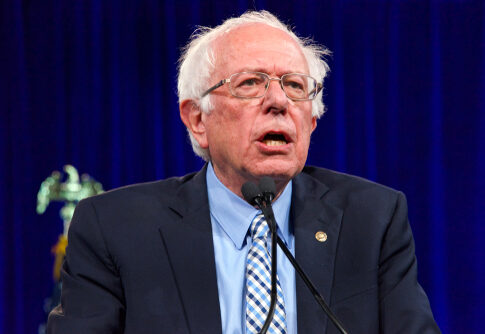Bernie Sanders has finally acknowledged what many of his supporters have claimed for years – that the Democratic Party poses a legitimate threat to democracy. The admission comes nearly a decade after Sanders faced significant institutional obstacles in his battle against Hillary Clinton. Will Sanders make another run at the presidency?
Sanders Confirms Democratic Party’s Threat to Democracy
Senator Bernie Sanders made a stunning admission during his appearance on the “Flagrant” podcast hosted by comedians Andrew Schulz and Akaash Singh. When directly challenged about the Democratic Party’s threat to democracy through its primary process, Sanders responded with a simple but powerful acknowledgment: “No argument here.”
The candid moment occurred as Schulz criticized the party for not allowing voters to elect their preferred candidates, specifically referencing Sanders’ treatment in past primaries. This remarkable admission follows years of speculation and anger among Sanders supporters who believed the Democratic National Committee actively worked against his candidacy in both 2016 and 2020.
🚨 Bernie Sanders Admits the Democrats Are the Threat to Democracy
AKAASH: “There hasn't been a fair primary for the Democrats since 2008. Are they not also a threat to democracy?”
BERNIE: “Yeah, I'm not going to argue with that” pic.twitter.com/AfVoKtw3Zn
— Chief Nerd (@TheChiefNerd) May 19, 2025
A History of Contested Primaries
The conversation brought to light long-standing grievances about the 2016 primary race where Sanders faced significant institutional obstacles against Hillary Clinton. Despite his massive grassroots support and momentum, the DNC’s preference for Clinton became evident through internal communications later revealed in controversial leaks.
When podcast co-host Akaash Singh suggested there hasn’t been a fair Democratic primary since Barack Obama’s 2008 victory, Sanders again agreed with the assessment. This acknowledgment validates claims from progressive voters who have long accused party leadership of interfering with democratic processes to favor establishment candidates.
Bernie Sanders sat down with podcaster Andrew Schulz for a revealing 80-minute conversation—and by the halfway mark, he started unleashing truth bombs.
He said the Democratic establishment sold out decades ago, trading working-class voters for wealthy donors and out-of-touch… pic.twitter.com/yHy5fVnDov
— The Vigilant Fox 🦊 (@VigilantFox) May 19, 2025
Personal Conflict and Political Pragmatism
Perhaps most revealing was Sanders’ admission about personal conflict within his own family regarding his decisions after losing the nominations. He disclosed that his wife believed he should not have supported the Democratic nominees after his candidacy was undermined, showing the personal toll these political decisions took.
Despite these feelings, Sanders explained his ultimate support for Clinton in 2016 and Biden in 2020 as pragmatic choices, viewing them as preferable alternatives to Donald Trump. The senator’s frustration was palpable as he described being forced to support candidates who lacked genuine popularity among voters while maintaining his stance against what he saw as worse options.
Sanders’ comments highlight the difficult position of progressive politicians working within a two-party system they view as fundamentally flawed. His willingness to publicly acknowledge these democratic deficiencies represents a significant moment of transparency from one of the left’s most prominent figures.


